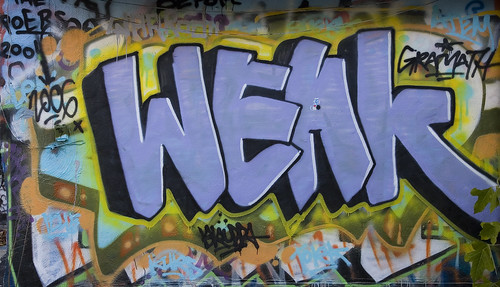When we first start writing, we often have . . . well, delusions of grandeur, to put it gently. We think our prose is the most mind-blowing thing to happen to books since Gutenberg.
Yeeeah, probably not. And that’s okay. When you’re first starting out, you often need that kind of enthusiasm and even pride to get going. It has its place—but it’s only useful if you can get past it.
 Discovering that you’re not, actually, the next Shakespeare is the first step. Once you really want to improve, you have to figure out where you need to work on next. Assessing your own weaknesses can be a challenge, but it’s an important part of becoming a better writer.
Discovering that you’re not, actually, the next Shakespeare is the first step. Once you really want to improve, you have to figure out where you need to work on next. Assessing your own weaknesses can be a challenge, but it’s an important part of becoming a better writer.
Reading
A writer should be a reader. Can you imagine a premiere chef who ate the same dinner—spaghettios and bagged salad—every night? That sounds ridiculous! We all recognize that a chef must cultivate his or her palate.
Reading functions a lot like eating for writers, and not just that we might die without either of them 😉 . There are other good reasons—you can identify tropes, trends and clichés;s, you can tell what you like and don’t in techniques, you can get great ideas. But possibly the most important reason a writer needs to read is to cultivate a literary “palate.”
We must learn to recognize good, “strong” writing and storytelling. At the very least, this is what I described on Janice Hardy’s blog last month as “technically solid writing that engages your emotions, tells a well-structured story, and doesn’t get in the way of connecting with the characters.” To understand this, you need to see good writing in action.
Another bonus: filling your head with other characters and plot lines and words can help to move your words out of the short- and medium-term memory banks, giving you fresh eyes for your own words again.
Time
First and foremost, you need to take time away from your writing. I know I often need to forget parts of a story, or the aspects of a character, or the individual words and sentences I crafted to create that story before I can look at them objectively. Some writers recommend weeks away from a story; others say months.
The exact time limit depends on you, and how well you already know your story. If you pounded it out in a matter of days (no judgments there!), and set it aside for two weeks, that might already be long enough. If you labored over it for six months, I’m guessing there may be some pieces in there you’ve already forgotten, but a good rest of a couple months or more will help give you fresh eyes.
Longer than six months drafting? Get started on your next draft and come back to this one when you’re done.
Eventually, with practice, you might learn to be less attached to your plot lines and characters, and you can judge their weaknesses more quickly.
Outside eyes
Possibly the biggest help would have to be good beta readers and critique partners. As far more impartial readers who want to help you make your story better (we hope), they have a vested interest in helping you eliminate all the weaknesses. They aren’t as attached to your story and your characters, so they are better at identifying places that don’t do much to move the story forward—the parts where their attention starts wandering. (Also helpful: the parts where they don’t know what you’re talking about.)
More writing
I love this example author Michelle Davidson Argyle shared here last year. Once, early in her career, her skill level seemed to be stagnant, despite working hard to improve and edit her work. Eventually, she decided to write a new manuscript, and she realized that was exactly what she needed to do to get better. She concluded (emphasis mine):
I’ve found that the more novels I complete, the more I learn and the better I get. The longer I spend on one novel doesn’t seem to get me nearly as far. I am not expanding my mind to different ways of thinking, different characters, different viewpoints, and different ways of experimenting with structure and telling a story. For me, at least, only new projects have been able to do that.
Amen!
An objective, complete read
Once I’ve taken the time to regain some objectivity, finally, one of the most important editing techniques I use is to give a draft—and hopefully each draft—an objective (you know, kinda), complete read, from start to finish.
This may work a bit differently for you, but when I do this, I also forbid myself to change things as I read. I’m allowed to fix typos and make notes (comments in Word), but I’m not allowed to get bogged down in fixing a problem I see right now. I make a note of it and move on, keeping up the momentum so I can get a better view of the manuscript as a whole.
As you read, you’ll begin to notice patterns—in your writing, in your critique partners’ comments. Do you tell and then show, or vice versa? Do you tend to use summary to move things along? Do you have characters that sound the same? Do your emotions need more depth, your plot need more twists, your characters need more conflict and growth? Where does your writing fall short of what you’ve learned is “good” from cultivating your palate?
You found a weakness. Now you know where to grow!
Check out my tips to becoming a better writer—and be sure to join my email newsletter, where we’ll take this tip to the next level this week!
Photo credit: Brooke Novak

